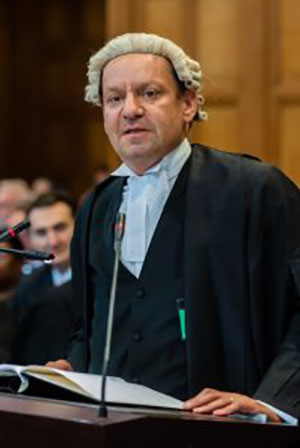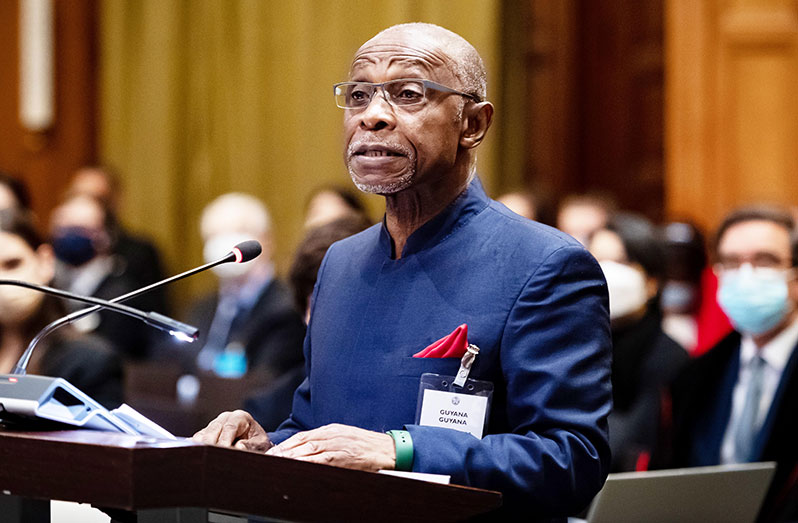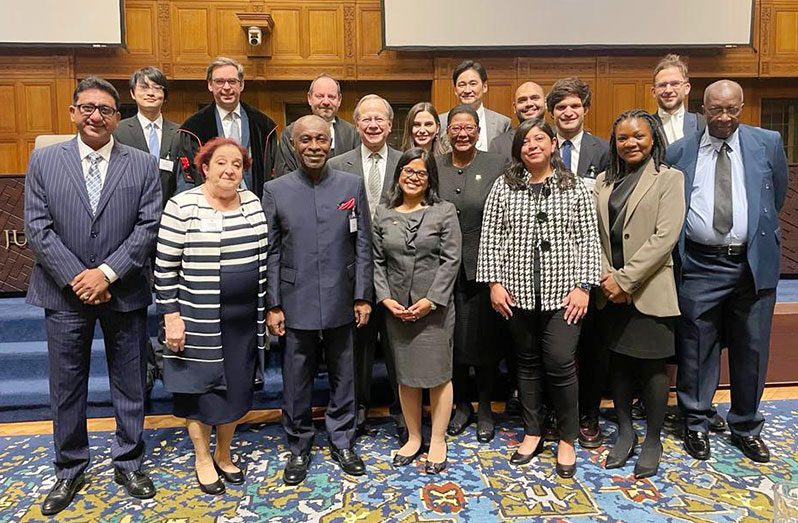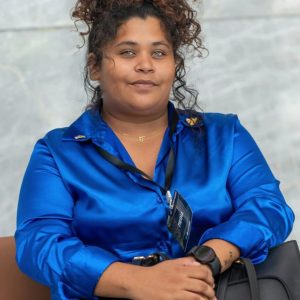–Guyana tells ICJ in response to Venezuela’s preliminary objections in border controversy case
GUYANA on Friday asked the International Court of Justice (ICJ) to reject the “meritless” preliminary objections that were raised by Venezuela in the border controversy case.
Professor Philippe Sands, KC, who is part of Guyana’s legal team, told the highest court in the world that Venezuela’s preliminary objections are “incoherent, legally misconceived, and factually baseless”.
Professor Sands said Venezuela’s preliminary objections totally ignored the realities of the 1966 Geneva Agreement, the aim of which was to address any controversy over the 1899 Arbitral Award.
Venezuela had asked the ICJ to dismiss Guyana’s application to reaffirm the validity of the 1899 Award, and solidify its support for a “peaceful resolution” of the Guyana/Venezuela border controversy.
Executive Vice-President of Venezuela, Delcy Rodríguez had claimed that the Spanish-speaking country is the “sole indisputable inheritor” of the Essequibo region and the Monetary Gold Principle.

Although Venezuela had claimed that the ICJ did not have jurisdiction to hear the substantive case, the country made a U-turn following the court’s December 2020 ruling, claiming that Guyana has no standing in the matter.
Venezuela argued that the United Kingdom is the proper party, since the territory was “given” to Guyana by the British.
“Venezuela’s claims of fraud and corruption are false, and they are to be treated with great caution… Their fanciful and unmeritorious nature makes it clear, crystal-clear Venezuela’s attack on the validity of the 1899 Award,” Professor Sands said while addressing specific factual allegations that were made.
He said that the nature of Venezuela’s arguments reflects the true purpose of the preliminary objections, which is to avoid the court addressing their “hopeless allegations”.
Describing the1966 Geneva Agreement as “the elephant in the room”, the professor said that Venezuela totally declined to refer to it in their presentation, but the United Kingdom had stated that it has no legal interests in the case, since Guyana is its own independent country.
He added that the issue of the validity of the 1899 Award is contradicted by Venezuela’s own conduct.
In his presentation, Professor Sands pointed out that Venezuela, a State that has long asserted an anti-colonial instinct, “now wishes to allow colonialism back in… through the front door”.
While dismantling Venezuela’s submissions, he added that Venezuela’s grounds for impugning the validity of the 1899 Award might be the best evidence it could find, but it is not strong enough to get its objections off the ground.
Professor Sands then turned his attention to the 1897 Treaty [known as the Treaty of Washington of 1897]. In that treaty, both parties agreed to respect the results of the arbitration as a full, perfect and final settlement of the boundary between the two countries.

He explained that Venezuela alleged that it had been coerced and deceived into accepting the treaty. Further, he said that Venezuela claims that it was somehow forced to accept a situation in which no national sat on the arbitral tribunal.
At the time, Guyana was a colony of Great Britain, and was known as British Guiana. The United States had stepped in and pressured the arbitration court to act.
The boundary and the corresponding territory of Guyana are internationally recognised.
Professor Sands submitted that Chapters Three and Seven of Guyana’s memorial on the merits comprehensively disprove Venezuela’s allegations.
“The record tells a very different story. They (Venezuela) actually warmly welcomed the involvement of the United States in assisting with the negotiation of the terms of the 1897 Treaty.
“Indeed, shortly after the Treaty was signed, the Venezuelan President… gave a speech to the country’s Congress. Welcoming, and I quote, ‘the way in which the United States intended to exercise the intervention solicited by Venezuela…’” he told the Court.
OUTRAGEOUS ALLEGATIONS
Professor Sands said that after the intervention, the Venezuelan President had said the controversy assumed a most favourable aspect, and he praised the United States’ laudable efforts to secure arbitration with Great Britain following its signature. The treaty was ratified by both chambers of the Venezuelan Congress, and great scenes of jubilation followed, which was a clear and formal recognition.
“Contrary to the tale that was spawned yesterday (Thursday), Venezuela was totally delighted with the state of play when the arbitration began. Now, yesterday, you heard Venezuela seek to cast the most serious aspersions on the conduct of the British legal representatives during the 1899 arbitral proceedings.
“The court was told that there was clear evidence of improper exchanges, and frequent and deeply irregular contact between Great Britain’s counsel and the two British arbitrators during the arbitrations. These are actions that Venezuela says amount to fraudulent conduct,” Sands said, adding that these are very serious allegations.
He pointed out that Venezuela continues to submit baseless claims, and asked the court to throw out the “utterly speculative” preliminary objections.
The professor emphasised that Venezuela sought on Thursday to portray the process, which culminated in the 1899 Award, as a “corrupt and unjust stitch-up designed to rob Venezuela of its precious territory and resources.”
He pointed out that this contention lacked much merit, and urged the court to look at the evidentiary record which showed that Venezuela enthusiastically engaged in the arbitration, and even praised the competence and independence of the arbitral tribunal.
He added that the country even publicly acclaimed the outcome as a victory and vindication for Venezuela.
Further, Professor Sands argued that Venezuela’s claim that the 1899 Award was the product of “improper collusion” and a “secret political deal” is as outrageous as it is unsubstantiated.
“It is contradicted by the evidential record, and by the outcome of the arbitration. It is fanciful that we submit no realistic prospect of Venezuela persuading the court that the award is invalid on this basis. This is precisely why…Venezuela now scrapes the barrel with its concocted newfound monetary gold argument,” he submitted.
Professor Sands submitted that the “monetary gold argument” was wholly misconceived by Venezuela, since it reflects the clearest expression by the United Kingdom that it accepts that it has no role in the matter at all.
Though a party to the agreement, the United Kingdom has unambiguously and explicitly affirmed that it shall have no role whatsoever in any aspect of the practical settlement of any part of that controversy.
ABSURD
While stressing that Venezuela’s contentions are “absurd”, since at no time after Guyana’s independence had the United Kingdom “ever asserted, claimed or even hinted that it has any possible interest in either the question of the validity of the 1899 Award or the location of the boundary between Venezuela and Guyana,” he added: “The reality is in our submission that Venezuela doesn’t really, truly regard the United Kingdom as an indispensable third party to these proceedings… The preliminary objections totally ignore the realities of the 1966 [Geneva] agreement and the court’s jurisprudence on the indispensable third party. They are totally hopeless. For these reasons… the preliminary objections must be rejected and precedent.”
Meanwhile, Agent of Guyana, Carl Greenidge said that the long-standing controversy has stubbornly defied resolution for more than half a century.
“It has cast a long and menacing shadow over Guyana’s security and development throughout its existence as a sovereign state, a shadow rooted in Venezuela’s efforts to raise the long-standing land boundary between our two countries, and lay claim to nearly three-quarters of Guyana’s land territory,” he told the court.
He added that the importance of international law is the bedrock of international peace and security and has never been more profound.
“It is important to be clear that Guyana brings those claims in the spirit of amity, not enmity towards Venezuela. Guyana desires a relationship characterised by mutual respect, good neighbourliness and full coexistence with its sister South American state.
“Guyana filed its application in the conviction, which was evidently shared by the Secretary General of the UN, that the final judgment by the court on the merits of Guyana’s claims will provide the surest and firmest foundation for such relations to flourish,” Greenidge said.
He added that following the Secretary-General’s decision to refer the matter to the ICJ in January 2018, and the filing of claims some two months later, Guyana had always hoped that Venezuela would engage constructively in the proceedings in order to facilitate the fair and timely resolution of the controversy by the court.
However, the agent said that, regrettably, Venezuela chose not to do so and instead chose not to file to participate in the oral hearing in June 2020.
Greenidge said that now, more than two years later, Venezuela has decided to participate formally in the proceedings before the court, and Guyana welcomes that decision.
“It regrets, however, that Venezuela’s formal participation takes the form of belated preliminary objections, which seek to prevent, and will inevitably delay the determination of the merits of Guyana’s claims and its regrets to the recent submission just one week before the hearing of a raft of new documents, the vast majority of which have nothing to do with the preliminary objections newly raised,” he said.
ATTEMPT TO DERAIL AND DELAY
Greenidge told the court that Venezuela’s preliminary objections appear to be a device intended to derail and delay the court’s determination of the merits of Guyana’s claims.
“Throughout these proceedings, Guyana and its people continue to have every confidence that the court will determine Venezuela’s preliminary objections fairly, impartially, and expeditiously and will vindicate the Secretary-General’s decision to influence the resolution of the party’s long-standing controversy to the court,” he said.
Professor Ordinaire, Université Catholique de Louvain and member of the Institut de Droit International, Foley Hoag, LLP and the Bar of Brussels, Pierre d’Argent on behalf of Guyana said that Venezuela’s claim was inadmissible.
Another member of Guyana’s legal team, Christina Beharry, who is a member of the Bars of the District of Columbia, the State of New York, England and Wales, and the Law Society of Ontario, made submissions on how Venezuela’s preliminary objections conflict with the 2020 ICJ judgement.
Member of the Bars of the United States Supreme Court and the District of Columbia, Paul S. Reichler addressed the legal standard under the monetary gold argument, and the fact that the UK is not an indispensable third party to the proceedings.
On November 21, Venezuela will make their second round of oral arguments. The next day, Guyana will do the same.
The hearings will be streamed live in English on the court’s website, and on UN Web TV.












